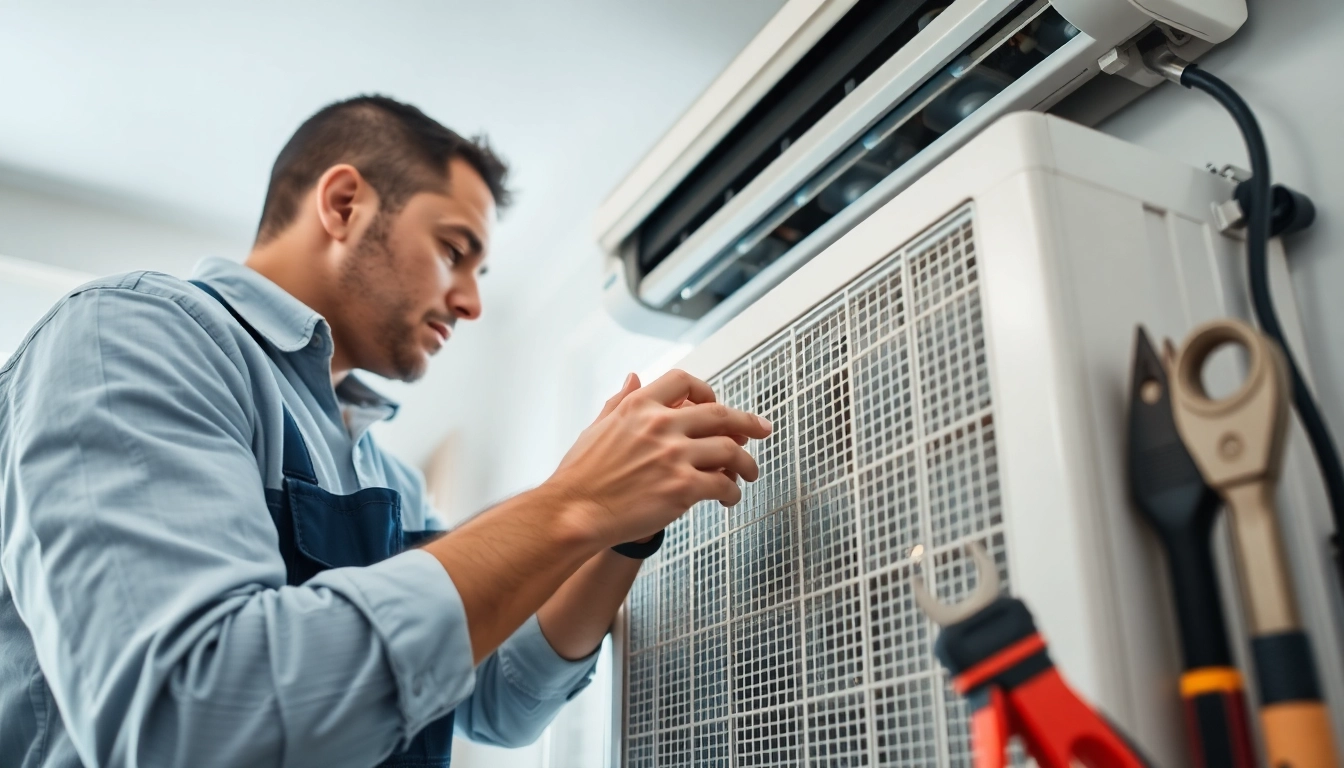Understanding HVAC Systems
Heating, ventilation, and air conditioning (HVAC) systems play a crucial role in maintaining comfortable indoor environments. These systems regulate air temperature, humidity, and quality, ensuring that our homes and workplaces provide the ideal climate. Understanding how these systems work can help homeowners and businesses alike manage their energy use and comfort levels effectively. The following sections will delve into the components, types, and common issues of HVAC systems.
Components of HVAC Systems
All HVAC systems consist of several major components, each playing a significant role in the system’s overall functionality:
- Heating Unit: This could be a furnace, heat pump, or boiler that warms the air or water in the system.
- Cooling Unit: The air conditioning component cools indoor air and removes humidity, employing a compressor and condenser.
- Ventilation System: Ducts and vents that circulate air throughout the space, including intake and exhaust paths for fresh and stale air.
- Controls and Thermostats: These ensure that the system operates at desired temperatures, adjusting settings based on user preferences.
Types of HVAC Systems
There are several types of HVAC systems, each serving different needs and applications:
- Split Systems: Comprising an outdoor compressor and indoor coil, these systems are versatile for both heating and cooling.
- Hybrid Systems: Combining the benefits of both gas and electric systems, hybrid systems reduce energy costs by switching between heating sources as necessary.
- Ductless Mini-Split Systems: Ideal for homes without ductwork, these systems offer individual control for different rooms or zones.
- Packaged Systems: These units combine all components in a single outdoor system, making them suitable for buildings without space for multiple units.
Common Issues with HVAC Systems
Understanding common issues with HVAC systems can help identify problems early and maintain efficiency. Some prevalent problems include:
- Inefficient Heating or Cooling: Often caused by dirty filters, blocked ducts, or malfunctioning components.
- Noisy Operation: Unusual noises might indicate worn parts or imbalances in the system.
- Erratic Thermostat Behavior: Thermostat inaccuracies can lead to uncomfortable temperatures and increased energy bills.
- Odors: Strange smells can signify mold in ducts or overheating wires, requiring immediate attention.
Identifying HVAC Problems
Recognizing when your HVAC system requires attention is essential to maintaining efficiency and comfort. Homeowners should be alert to signs that indicate a need for repair-Hvac.
Signs Your HVAC Needs Repair-HVAC
There are several indicators that suggest your HVAC system may need repairs:
- Inconsistent Temperature: Variability in temperatures from room to room can signify underlying issues.
- Frequent Cycling: If your system is frequently turning on and off, it might be struggling to regulate temperature efficiently.
- High Energy Bills: A sudden increase in utility bills can indicate an inefficient HVAC system.
- Humidity Problems: Excess moisture or dryness can suggest issues with your cooling system’s ability to manage humidity levels.
Diagnosing Common HVAC Issues
To accurately diagnose HVAC issues, consider the following steps:
- Monitor Performance: Keep track of how your system operates, noting any irregularities.
- Inspect Filters: Regularly check and replace filters, as dirty filters can significantly impact efficiency.
- Check Thermostat Settings: Ensure the thermostat is correctly calibrated and set to the desired temperature.
- Audit Insulation: Poor insulation in ductwork can lead to energy loss, affecting system performance.
Using Diagnostic Tools Effectively
Using diagnostic tools can help streamline the process of identifying HVAC problems:
- Multimeters: Essential for checking voltage and current, multimeters can help assess electrical issues.
- Manifold Gauges: Used for measuring refrigerant pressure, these gauges assist in diagnosing cooling issues.
- Thermometers: Infrared thermometers can identify temperature changes across different system components.
Repair-HVAC Techniques
Once issues have been identified, implementing effective repair techniques is vital. Understanding the underlying principles of HVAC repair is essential for ensuring long-term system functionality.
Basic Repair-HVAC Procedures
Basic procedures can address many common HVAC issues:
- Filter Replacement: Regularly replacing filters allows for better airflow and efficiency.
- Cleaning Coils: Dirty coils can impede performance; cleaning them can improve efficiency.
- Checking Refrigerant Levels: Assessing refrigerant levels can help identify leaks and ensure optimal cooling.
Advanced HVAC Repair Techniques
More complex HVAC systems may require advanced repair strategies, such as:
- Electrical System Repair: Addressing wiring issues and broken components necessitates expertise in electrical systems.
- Refrigeration System Repairs: Repairing leaks and replacing compressors requires specialized knowledge and tools.
- Heat Exchanger Replacement: This advanced procedure typically requires professional skills due to safety risks and complexity.
Tips for Efficient Repairs
To ensure repairs are performed efficiently and effectively, consider these tips:
- Document Issues: Keeping a record of ongoing issues helps technicians understand the problem better during repairs.
- Follow Manufacturer Guidelines: Always adhere to manufacturer manuals for specific repair procedures and components.
- Use Quality Parts: Investing in high-quality replacement parts can enhance system longevity and performance.
Maintenance Tips for HVAC Systems
Regular maintenance is key to extending the life of your HVAC system and preventing costly repairs. Implementing effective strategies can also enhance energy efficiency.
Regular Maintenance Practices
Homeowners should adopt the following practices to maintain their HVAC systems:
- Scheduled Inspections: Regular professional inspections can identify potential issues before they escalate.
- Filter Maintenance: Schedule monthly filter checks and replacement, depending on usage and environmental factors.
- Cleaning Ducts: Cleaning ducts reduces dust and allergens, ensuring better air quality and system efficiency.
Seasonal HVAC Checklist
Using a seasonal checklist will help homeowners manage the maintenance of their HVAC systems effectively:
- Spring: Check AC units, clean air filters, and ensure all vents are unobstructed.
- Summer: Inspect refrigeration levels, clean outdoor units, and maintain proper airflow inside.
- Fall: Prepare heating systems by inspecting furnaces and cleaning ducts in anticipation of winter.
- Winter: Ensure heating units are functioning properly, checking for any possible malfunctions.
Maximizing HVAC Efficiency
To maximize the efficiency of HVAC systems, consider these strategies:
- Optimize Thermostat Settings: Set the thermostat to energy-efficient temperatures and consider programmable thermostats.
- Seal Leaks: Sealing leaks in ducts can significantly improve energy efficiency and reduce utility costs.
- Ventilation Optimization: Ensuring adequate ventilation helps the system operate effectively while improving air quality.
Choosing the Right HVAC Technician
Selecting a qualified HVAC technician is crucial for effective repair and maintenance services. The choice can significantly impact your system’s performance and longevity.
Qualifications to Look for in a Technician
When evaluating potential HVAC technicians, consider these qualifications:
- Licensing: Ensure the technician is licensed and insured for HVAC work in your state.
- Experience: Look for technicians who have several years of experience and positive customer reviews.
- Specializations: Some systems may require specialized knowledge; choose a technician familiar with your specific system type.
Questions to Ask Before Hiring
Engaging potential HVAC technicians with the right questions can help you gauge their qualifications:
- What HVAC systems do you specialize in?
- Can you provide references from previous work?
- What warranties do you offer for your work and parts?
- How do you handle emergency repairs?
Evaluating Repair-HVAC Services
To evaluate potential repair-HVAC services, consider the following factors:
- Pricing: Compare estimates from different technicians to find reasonable pricing without sacrificing quality.
- Response Time: Choose a technician who can respond promptly to repair requests, especially in emergency situations.
- Customer Service: Assess the technician’s communication skills and willingness to answer questions throughout the service.


